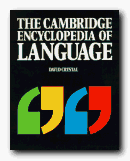history, grammar, and use of world’s languages
If you take a close interest in language, a dictionary alone is sometimes not enough. You occasionally need a book like this which can explain basics. It isn’t an encyclopaedia in the normal sense: it’s a very readable series of articles, essays, definitions, tables, maps and pictures on every conceivable aspect of languages from around the world. In fact it’s the only reference book of its kind I’ve ever read all the way through, from start to finish. David Crystal has devoted his life to the study of language, and of all his many books on the subject, his Cambridge Encyclopedia of Language is the one to which I return most often.
 It’s a wonderful compendium of easily accessible information on all aspects of language, and there are gems of information on every page. It is written in a lively, non-pedantic style, and is profusely illustrated in such a way as to reinforce our understanding and make it more interesting.
It’s a wonderful compendium of easily accessible information on all aspects of language, and there are gems of information on every page. It is written in a lively, non-pedantic style, and is profusely illustrated in such a way as to reinforce our understanding and make it more interesting.
He offers a very readable and humane way to introduce anyone to the wonders and mysteries of human language. He covers topics such as the origins and diversity of languages; the differences between the spoken and the written word; phonetics, semantics, and stylistics; the contentious issues of pronunciation, accent, dialect, and slang; alphabets, dictionaries, and thesauri; language acquisition and language change; grammar, spelling systems, and graphology. If it’s remotely connected with language, you will find it here – explained in a straightforward and often quite amusing manner.
I’ve used this book regularly ever since it first appeared. In fact it oscillates between office and home. The first version appeared in 1987, but you should make sure you get the latest second edition, because David Crystal has added material which takes into account the linguistic changes wrought in the decade since the original’s inception. It also includes a comprehensive glossary of terms and long lists of suggestions for further reading. There’s everything here you will need until you are ready to study language at quite an advanced level.
© Roy Johnson 2010
David Crystal, The Cambridge Encyclopedia of Language, Cambridge: Cambridge University Press, 3rd edn 2010, pp.524, ISBN: 0521736501
More on language
More on literary studies
More on writing skills
More on creative writing
More on grammar